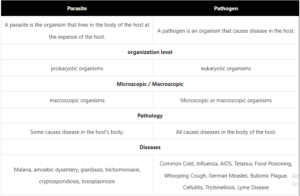Difference between Pathogen and Parasite


The main difference between pathogen and a parasite is that a parasite is a type of pathogen while a pathogen is a disease-causing agent. A parasite is a prokaryotic Organism while a pathogen is a eukaryotic organism. More Differences between Parasites and Pathogens are given below.
Keep reading …
Parasite vs Pathogen
A parasite feeds, grows, and takes refuge in the host organism without contributing to the survival of the host, while the pathogen is an organism that causes disease in the host.
Parasites can be multicellular like worms and unicellular e.g. protozoa while pathogens are mostly unicellular e.g. bacteria, viruses, etc.
Parasites cause disease in hosts, but in some cases, they can be beneficial to the host, for example, some species of protozoa have a specific function for the digestion of cellulose in the grass within the rumen of a cow. But pathogens are always disease-causing agents for their hosts. Protozoa, helminths, and ectoparasites are the main types of parasites.
What is the parasite?
A parasite is always dependent on its host for survival because it lives on and depends on the host for nutrition and usually harms the host. It cannot live, grow and reproduce without a host. For this reason, a parasite does not kill its host, but spreads disease and is fatal.
Parasites are generally smaller than their hosts and multiply very quickly. It uses the resources of the host to fuel its life cycle. Parasites vary widely. Almost 70% of parasites are not visible to the naked eye, for example, the malaria parasite, but some types of worm parasites can reach more than 30 meters in length. The parasite is not a disease itself, but it spreads diseases and has different effects. There are three types of parasites; Protozoa, helminths, and ectoparasites.
Types of Parasites
- Protozoa: These are single-celled organisms known as Plasmodium. Protozoa can only reproduce within the host.
- Helminths: are parasites of worms. Schistosomiasis is caused by a helminth. Other examples in this category are roundworms, pinworms, trichina spiralis, tapeworms, and trematodes.
- Ectoparasites: These types of parasites live on the host and include lice and fleas.
Prevention
- Make sure the food is fully cooked.
- You are using insect or mosquito repellent.
- Knowing the type of prevalence of parasites in the area, you can travel.
- Drink bottled water on the go.
- Be careful when bathing in rivers or lakes
What is a pathogen?
Pathogen is anything that causes disease in the host. Humans are called exposed when in contact with pathogens and are considered infected when pathogens enter the body and cause infection. There are six types of pathogens; viruses, bacteria, fungi, protozoa, helminths, and Rickettsia.
Types of Pathogens
- Viruses: Viruses are small infectious agents that multiply only within the cells of the host body. It contains the genome of DNA and RNA in a protein coat called a capsid. The virus has the potential to infect all kinds of life, animals, plants, and even microorganisms.
- Bacteria: Bacteria comprise individual cells that can thrive in various environments. They are a few micrometers in length and come in different shapes, such as rods, spirals, and spheres. The bacteria mainly cause fever, chills, inflammation of the lungs, cough, and shortness of breath.
- Fungi: These include yeast, fungus, and mold. These are unicellular or multicellular parasitic organisms.
- Protozoa: They are small single-celled microorganisms that cause toxins that cause disease. Malaria is a disease caused by protozoa.
- Helmintos: son gusanos parásitos que son visibles a simple vista. Estos se alimentan de un huésped vivo para obtener energía, nutrientes y protección y producen enfermedad y fatiga en el huésped.
- Rickettsia: son patógenos que crecen dentro de las células vivas y son similares a las bacterias, por ejemplo, el tifus.
Difference Between Pathogen and Parasite in points
A parasite is an organism that lives in or on another organism at the expense of the host while A pathogen is an agent that causes a disease to its host.
Protozoa and helminths are parasites examples while Pathogens can be bacteria, fungi, viruses, prions, protists, and parasites.
Most parasites are prokaryotic organisms except parasites and fungi while Pathogens are eukaryotic organisms.
Parasites are microscopic organisms while Pathogens can be microscopic or macroscopic organisms.
Not all parasites cause disease in the host organism while All pathogens cause disease in the host organism.
Malaria and amoebic dysentery are examples of diseases caused by parasites while Common colds, influenza, AIDS, tetanus, and food poisoning are diseases caused by pathogens.
Related Articles:
Related Post
Recent Posts
Is energy quantized in classical physics?
No, according to classical wave theory the emission of electromagnetic radiations from the surface is…
Types of laser
Basically, there are four types of laser which includes: Gas Lasers Solid State lasers Liquid…
Ultrasound frequency range
What is ultrasonics? The study and application of mechanical vibrations with frequencies beyond the limits…
Electromagnetic Energy: What are some examples of it?
Electromagnetic energy definition Electromagnetic energy is the amount of energy stored in a region of…
Fundamental units and Derived Units with Examples
The Main Difference between fundamental Units and Base units is that Units that Express base…
Newton’s First law of Motion Examples in Our Daily Life
Newton's first law of motion states that " A body continues its state of rest…